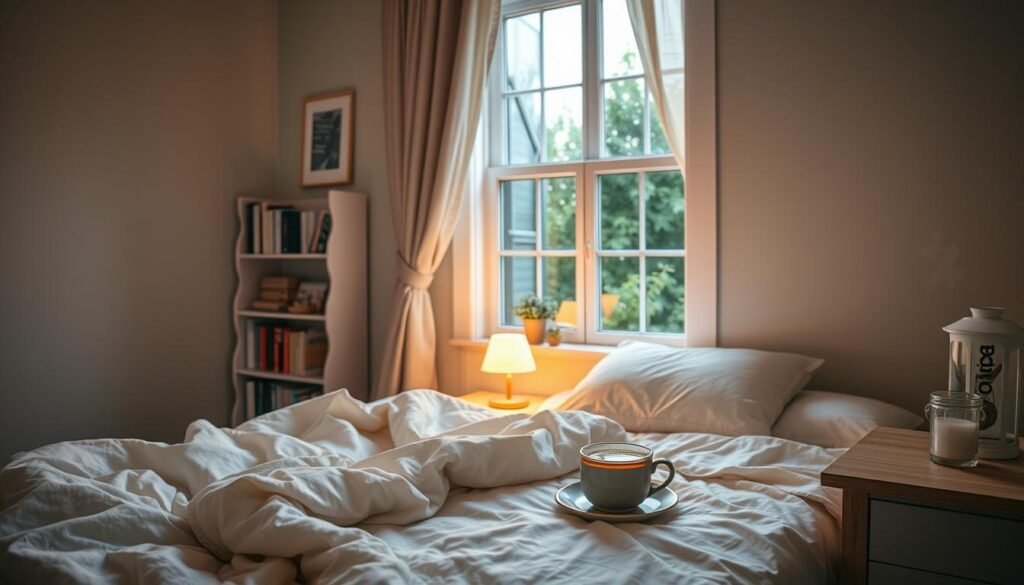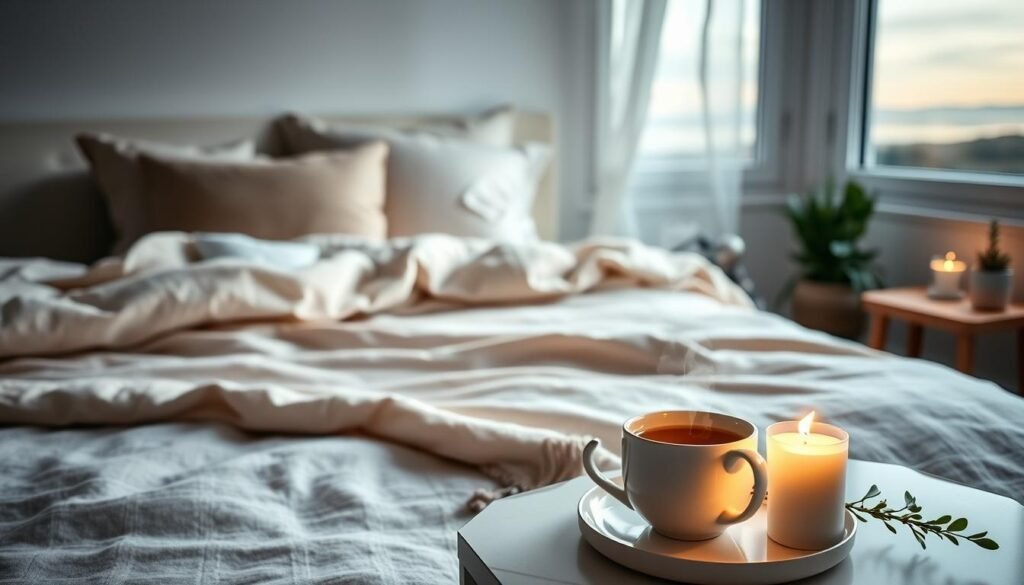About 30% of U.S. adults struggle with insomnia a few times weekly. This issue harms their work, mental health, and life quality. Before using medicines, it’s key to try basic sleep improvement steps. Changing your lifestyle, using mindfulness, and following sleep cleanliness tips can really help.
We’ll look at different ways to beat insomnia, like Cognitive Behavioral Therapy (CBT). CBT often works better than pills. Also, having regular sleep times and a good sleep setting can change everything. As you read, you’ll find tips and steps to sleep better and take control of your nights.
Key Takeaways
- Approximately 30% of adults in the U.S. experience insomnia frequently.
- Cognitive Behavioral Therapy (CBT) is a leading treatment option for insomnia.
- Establishing a consistent sleep schedule improves sleep quality significantly.
- Relaxation techniques, such as meditation and yoga, can aid in overcoming insomnia.
- Creating a sleep-conducive environment enhances the chances of restful sleep.
- Avoiding caffeine and alcohol close to bedtime can positively impact sleep.
Understanding Insomnia
Insomnia is a common sleep disorder. It impacts a lot of people. Some face sleep issues occasionally, like trouble falling asleep or staying asleep. These problems hit up to two-thirds of people at times. About 10% to 15% deal with chronic insomnia. This means they have sleep problems at least three days every week for over three months. Not dealing with insomnia can harm your life quality. It can lead to anxiety, depression, and even heart disease.
What causes insomnia? Several factors can raise your risk. Being older, a woman, having a lower income, or certain health issues like diabetes matter. Also, feeling anxious or depressed can make insomnia worse. The same goes for other sleep issues such as restless legs or sleep apnea. Nearly 75% of older adults have insomnia. This often ties back to their body clock and feeling lonely.
Insomnia shows up in various ways. Some may find focusing hard, or they might forget things more often. Others feel tired all the time. But there is a leading treatment for chronic insomnia. It’s called cognitive behavioral therapy for insomnia (CBT-I). After therapy, it’s crucial to keep up good sleep habits to avoid the problem coming back.
There are many ways to manage insomnia symptoms. These include medications like eszopiclone or natural aids such as melatonin. Warm milk, herbal teas, and meditation can also help soothe sleep troubles. When therapy and changes in your lifestyle don’t cut it, these options might be worth a try.
To learn more about how to sleep better and understand different sleep disorders, visit this link.
Identifying Causes of Insomnia
Learning about the causes of insomnia helps improve sleep and health. Insomnia can come from many things, both in the mind and body. It influences how well we fall and stay asleep. Knowing what affects sleep is key to managing sleep problems better.
Common Factors Contributing to Sleeplessness
Many things can trigger insomnia, from daily habits to health issues. Key triggers include:
- Stress and Anxiety: These upset sleep by harming mental health.
- Irregular Sleep Schedules: Changing sleep times often can mess with our internal clock.
- Caffeine and Alcohol Consumption: Both can ruin sleep quality.
- Health Disorders: Issues like restless leg syndrome or pain disturb sleep.
- Medications: Some medicines, like antidepressants or antihistamines, may worsen sleep.
Addressing these factors can improve how well we sleep. For more details on insomnia causes, it’s wise to seek medical advice.
The Impact of Stress and Mental Health
Mental health and sleep have a strong link. Issues like anxiety and depression are often connected to insomnia. People with these conditions might find it hard to stop worrying or calm down, which makes sleeping difficult. Also, constant stress can keep insomnia going, increasing the risk of other health problems.
To handle insomnia well, we need to understand mental health symptoms and origins. For a deep dive into common insomnia triggers, examining how each one affects sleep can be very helpful.
Initial Steps for Insomnia
Dealing with insomnia starts by taking smart initial steps to better understand and enhance sleep quality. One proven strategy is to keep a sleep diary. It lets people track their sleep habits and quality, which helps find out what affects their sleep.
Keeping a Sleep Diary for Better Insights
Keeping a sleep diary involves noting down key details, like when you go to bed and wake up. This record sheds light on habits that might lead to insomnia. It tracks daily activities, how much caffeine you drink, and stress levels to see how they relate to sleep issues.
For those trying to get to the root of their sleep problems, a sleep diary is incredibly helpful. It reveals patterns you might miss and helps spot trends over time.
Recognizing Patterns That Affect Sleep Quality
After filling out the sleep diary, the next step is to look at the data. Spotting sleep patterns can guide necessary changes in your daily routine. Things like exercise, what you eat, and night-time screen use can all affect how well you sleep.
By closely reviewing this data, you can make better choices to improve your sleeping environment or habits.
In the end, using these insights to make adjustments can help in managing insomnia well. For more help on treating sleep issues, check out this link for advanced sleep disorder.
Establishing a Bedtime Routine
Having a bedtime routine is key for better sleep. It helps your body know when it’s time to sleep. Keeping the same sleep time every day improves sleep. This tells your body when to rest, leading to deeper sleep.
Importance of Consistent Sleep Schedule
Sticking to a sleep schedule helps you ease into sleep. It teaches your body when to expect bedtime. For example, avoid electronics an hour or two before bed. This prevents sleep problems caused by light from screens.
Creating a Relaxing Pre-Sleep Ritual
Making a calming ritual before bed helps sleep quality. Activities like reading or meditation relax the body. Avoid big meals right before bed. Ensure your sleeping area is quiet and for sleep only. This helps your brain associate the space with rest.

Focus on these steps to break bad sleep habits. A regular bedtime and sleep schedule benefits your health. Check out this resource for more tips on sleep routines.
Sleep Hygiene Tips
It’s key to have good sleep habits for beating insomnia and boosting your health. Making your sleep space great and handling how much light you get will really help you sleep better. Knowing how to do this lets you make a space that’s perfect for deep sleep.
Creating an Ideal Sleep Environment
Having the right sleep setup is super important for good sleep. A few things make up this setup, like:
- Comfortable bedding: A good mattress and pillow are key for restful sleep.
- Room temperature: A cooler room, between 60 and 67°F (15.6 and 19.4°C), is best for sleeping.
- Noise reduction: Cutting down on outside and inside noise can mean fewer wake-ups.
- Darkness: A dark room helps your body make melatonin, which you need to sleep.
These steps are easy and cheap to try, and they’re safe for most people looking to sleep better. Check regularly how your sleep space feels to see if you can make it even better.
Managing Light Exposure Before Bed
Light and sleep are closely connected. How you manage light before bedtime really matters. Here are some key moves:
- Reduce screen time: Avoid phones and computers at least an hour before sleep to reduce blue light.
- Utilize warm lighting: Evening lights should be warm, making it easier to relax.
- Stay consistent: A routine with natural light during the day helps your natural sleep cycle.
- Avoid bright lights: Dim lights as you get near bedtime tells your body it’s time to sleep.
Following these tips can make your sleep environment ideal, attacking the main needs for good sleep quality.
Utilizing Relaxation Techniques
Nowadays, finding ways to relax is key, especially for those who have trouble sleeping. Nearly one in three adults struggle with long-term insomnia. It’s important to try different methods like being mindful and doing gentle exercises. These can help soothe the mind and get the body ready to sleep.
Benefits of Mindfulness and Meditation
Mindfulness and meditation really help with sleeping better. Getting into relaxation practices can start your body’s stress-free response. Using deep breathing and the 4-7-8 technique can slow everything down.
Practicing things like NSDR and imagining peaceful scenes can make a calm state perfect for sleep. Doing these often can make a big difference.
Incorporating Gentle Yoga into Your Evening Routine
Having yoga in your nightly routine can tackle sleep issues. Using muscle relaxation helps you know and ease body tension. Yoga nidra brings a relaxing meditation that deepens body-mind connection.
The Power Down Hour splits the hour before sleep into relaxing parts. This includes easy stretching or yoga poses to relax fully.

People who keep up with these methods see mood boosts and feel better overall. Making your own yoga plan for the evening, along with mindfulness, improves relaxation. Trying these methods helps now with sleep problems and helps build good sleep habits for the future.
Cognitive-Behavioral Therapy for Insomnia
Cognitive-behavioral therapy for insomnia (CBT-I) is a top way to tackle ongoing sleep issues. It works by changing the negative thoughts and actions that lead to insomnia. It helps people change how they think and act about sleep, leading to better night routines.
How CBT Addresses Sleeplessness
CBT uses six to eight sessions to fully address insomnia. In these sessions, specific strategies help reduce sleep problems. For example, Sleep Restriction Therapy limits time in bed to increase sleep drive and speed up sleep onset.
Another key strategy is Stimulus Control Therapy. It makes people use their bedroom only for sleep and intimacy. By doing this, it breaks the link between the bed and activities that can stop good sleep, like watching TV or working.
The Role of Thoughts in Sleep Disorders
What we think affects how we sleep. Cognitive Therapy targets and fixes wrong beliefs about sleep. It helps patients set realistic sleep expectations, helping them fall and stay asleep. Relaxation methods in CBT-I, like deep breathing and muscle relaxation, help calm the mind.
By working on these thoughts, people can manage stress and anxiety better. This makes sleep more achievable. CBT-I offers a way to improve sleep by changing our thoughts and behaviors.
Healthy Sleep Habits to Embrace
Developing healthy sleep habits is important for good sleep. A balanced lifestyle helps improve overall well-being. Physical activity affects mood and energy all day.
Consistent, moderate exercise helps sleep better and fights insomnia.
Maintaining a Balanced Lifestyle for Better Sleep
A balanced lifestyle helps you sleep well. It includes good food, managing stress, and having friends. Setting work limits is also important for relaxation.
Having support helps create balance. This leads to better sleep and well-being.
The Importance of Regular Physical Activity
Exercise improves sleep quality. Working out in the morning or afternoon leads to deeper sleep. Activities like walking, jogging, or yoga lower stress and help you relax.
Adding exercise to your day helps you sleep better. This means you’ll sleep more soundly.
| Activity Type | Timing | Benefits for Sleep |
|---|---|---|
| Cardio (e.g., walking, running) | Morning/Afternoon | Improves sleep efficiency and reduces insomnia symptoms |
| Strength Training | Early Evening | Promotes relaxation and eases muscle tension |
| Yoga and Stretching | Before Bed | Enhances relaxation and prepares the mind for sleep |
| Outdoor Activities | Anytime | Encourages natural light exposure and increases overall activity |
Following these habits can make your sleep better. Mixing physical activity with a balanced life fights insomnia. It boosts mental and physical health.
Understanding Insomnia Treatment Options
People with insomnia often look for good treatments. They can choose between drugs a doctor prescribes and other options. Knowing the difference between these can help improve sleep quality.
Evaluating Prescription vs. Non-Prescription Solutions
Doctors sometimes prescribe drugs known as benzodiazepines and nonbenzodiazepine receptor agonists for insomnia. These drugs can help you fall asleep faster and sleep better. But, benzodiazepines can lead to dependency, so it’s best to use them with caution. Nonbenzodiazepines might have a lower risk of addiction.
Some people try over-the-counter remedies like antihistamines. Although they may help at first, they often have side effects. And, their long-term reliability for treating insomnia is not proven, making them less ideal for ongoing problems.
Long-Term Effects of Sleep Medications
Using prescription drugs for insomnia for a long time can cause side effects and addiction. This is especially true for those with a history of substance abuse. Stopping the medications suddenly can lead to rebound insomnia. Doctors suggest starting with the lowest dose possible and using it for the shortest time needed.
There are new drugs like suvorexant and lemborexant for insomnia. They work by targeting specific brain receptors to help with sleep. Always talk to a healthcare provider to find the best treatment for your situation.
Natural Remedies for Sleeplessness
Many people look for natural ways to fight sleeplessness. They do this when common methods don’t help much. Trying out herbal teas and sleep habits, along with the calmness from aromatherapy, can make nighttime more peaceful and sleep more refreshing.
Herbal Teas and Supplements to Enhance Sleep
Herbal teas are popular for helping people relax and sleep better. Here are some common ones:
- Chamomile: It’s famous for its ability to calm, leading to better sleep, especially in older people.
- Valerian Root: People have used this for sleep troubles for a long time. Often, 400–900 mg is taken at night.
- Lavender: Lavender oil or tea can improve your sleep and lessen anxiety. Many studies back up its use.
- Passionflower: Some research shows it might help with sleep in the short term.
Magnesium supplements can also help. Taking 500 mg daily might cut down on insomnia symptoms and better your sleep. If anxiety keeps you up, using melatonin supplements, between 1–5 mg, might help too.
Utilizing Aromatherapy for a Calming Effect
Aromatherapy is a soft way to ease into relaxation using essential oils. Some popular ones are:
- Lavender Oil: Its calming scent can help you fall asleep faster and stay asleep longer.
- Chamomile Oil: Known for relaxation, it may help decrease anxiety. Its effect on sleep directly varies.
- Valerian Essential Oil: Like the supplement, this oil may enhance sleep quality. It’s often used before bed.
Using these aromatherapy tips in your evening routine, like in a diffuser or through massages, can make your sleep space more serene. Adding these natural solutions to regular sleep habits can make your sleep deeper.

| Herb/Supplement | Typical Dosage | Benefits |
|---|---|---|
| Chamomile | 1 cup tea or extract | Improves sleep quality |
| Valerian Root | 400–900 mg | Helps with sleep onset |
| Magnesium | 500 mg daily | Reduces insomnia symptoms |
| Lavender Oil | Few drops in diffuser | Improves sleep onset |
| Melatonin | 1–5 mg | Enhances sleep quality |
Lifestyle Changes for Better Sleep
Making smart changes to your lifestyle can really help you sleep better. Cutting down on caffeine and alcohol is key. Drinking these before bed can mess up your sleep.
Reducing Caffeine and Alcohol Intake
Caffeine can really impact the quality of your sleep. Having it late can shorten your sleep by 45 minutes. It also makes your sleep less restful by 7%. Even some decaf coffees have caffeine, which can still affect your sleep. Drinking alcohol often can mess with your sleep too. It can even make you more likely to sleepwalk. To sleep better, try drinking less caffeine and alcohol at night.
The Importance of Meal Timing and Composition
When and what you eat influences your sleep. Eating big, fatty, or sugary meals late can keep you from deep sleep. But, eating more fiber can make your sleep better. Try to have dinner a few hours before bed. Choose lighter dinners, maybe with less carbs. Spicy foods can cause heartburn, which is bad for sleep. This is true especially if you have sleep apnea. Eating at the same times every day helps your body clock, leading to better sleep.
| Food Type | Impact on Sleep Quality |
|---|---|
| High-Fat Foods | Fragmented sleep; excessive daytime sleepiness |
| High-Sugar Foods | Less deep sleep |
| Fiber-Rich Foods | More deep sleep |
| Spicy Foods | Potential heartburn; reduced sleep quality |
| Protein (e.g., Steak, Chicken) | Long digestion time; can disrupt sleep |
Conclusion
In conclusion, beating insomnia needs us to look at it from many angles. About 10% to 20% of people face insomnia, highlighting its effect on our daily lives. It’s crucial to take steps such as keeping a regular sleep schedule, having a calming routine before bed, and ensuring a comfy place to sleep. These steps can make a big difference in how well we sleep.
Making changes in our daily habits is also key. Adding exercise, doing relaxation exercises, and trying out natural remedies can boost our well-being. They can also help us sleep better. Behavioral strategies, like Behavioral Activation, are good alternatives to medicines. They focus on changing our actions and teaching us, which has long-lasting benefits.
To wrap up, it’s important to be proactive about sleep problems. People dealing with these issues should try out the methods mentioned. Taking these actions, and possibly getting help from a professional, can not only better sleep quality. It can also improve our overall health and life satisfaction.